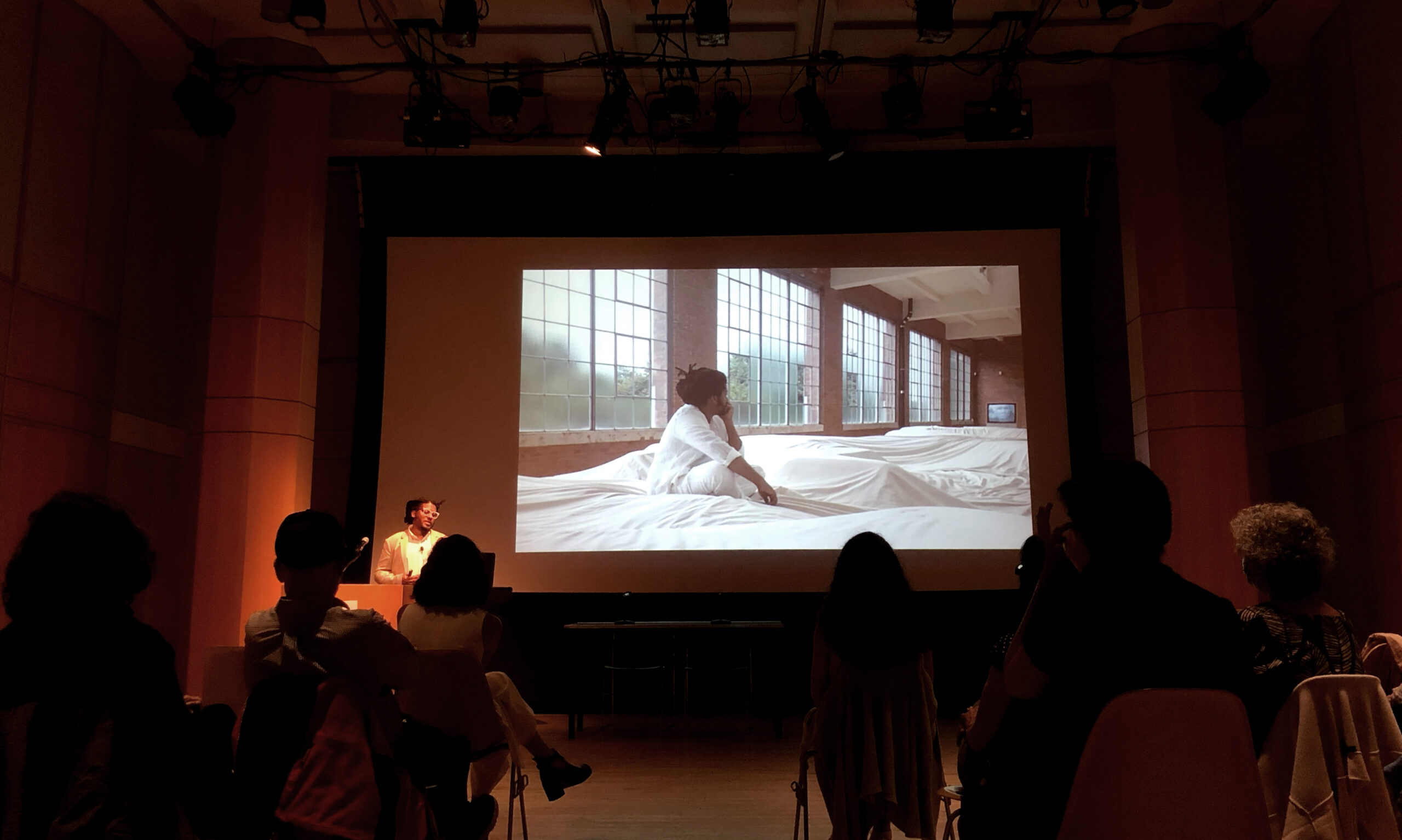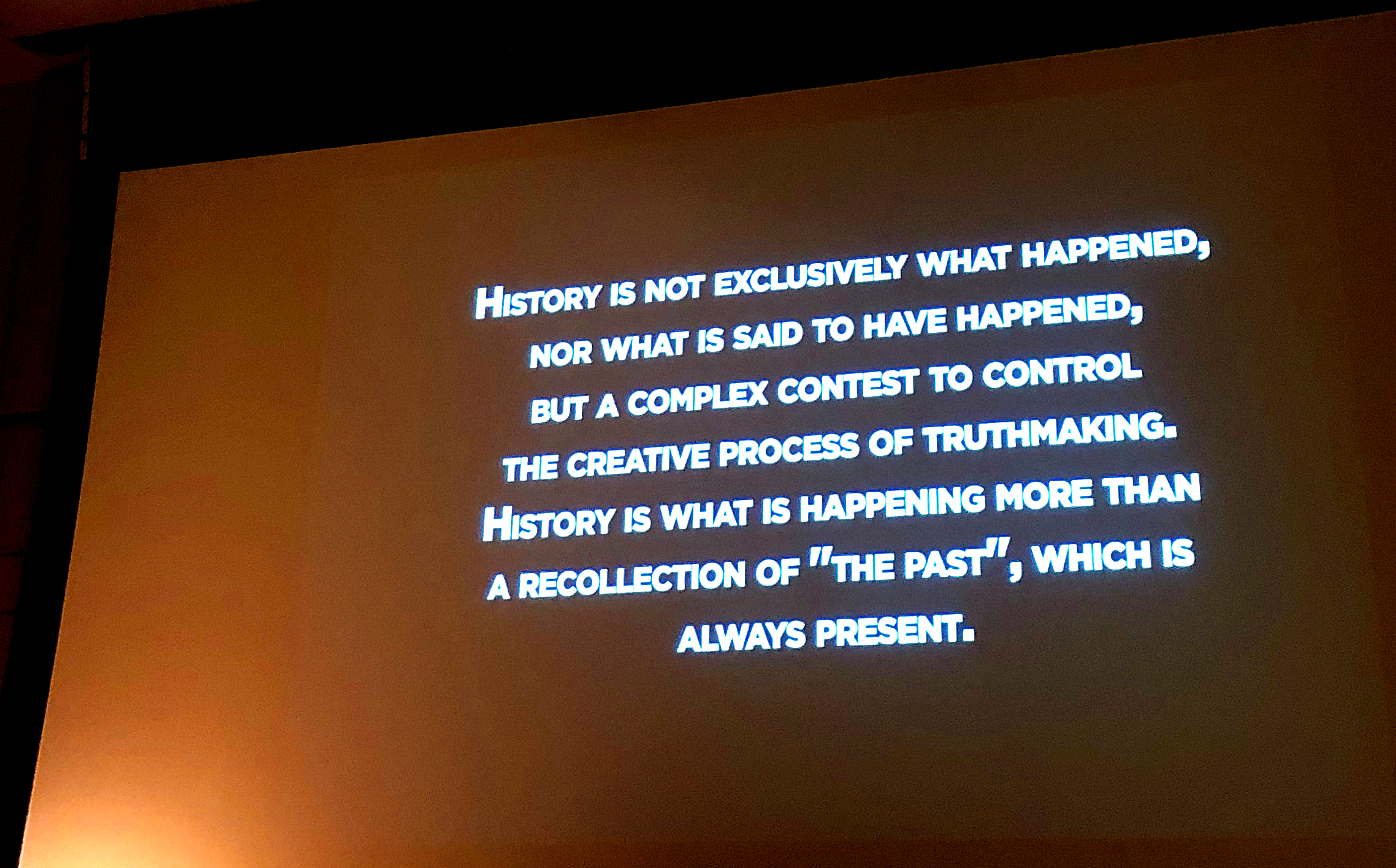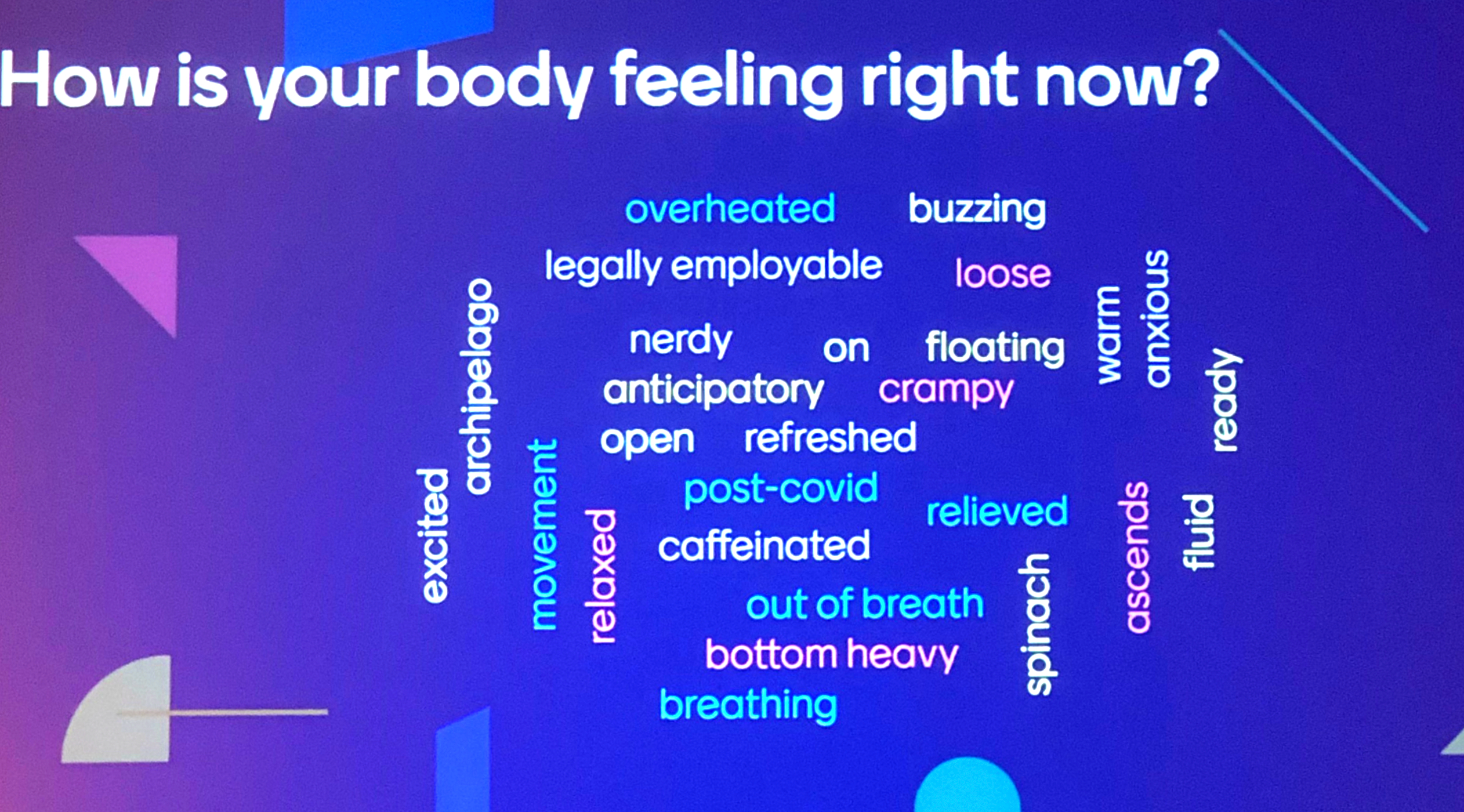Storytelling as Healing Practice: A Retrospective on Kamau Ware at the Graduate Center, CUNY
December 1, 2022

Helena Najm in Conversation with Nawal Muradwij, Dunni Oduyemi, and Alexandra Rego of Mindscapes
On May 20, 2022, CUNY’s Center for Humanities welcomed Kamau Ware, a storyteller and founder of the Black Gotham Experience, for an event “For What? For Whom? An Evening of Collective Storytelling” at the CUNY Graduate Center. The event was organized as part of the Center’s collaboration on Mindscapes, Wellcome’s international cultural program on mental health and well being. It was organized and moderated by Mindscapes Graduate Research Assistants Nawal Muradwij, Dunni Oduyemi, and Alexandra Rego, with support from Rebecca Hayes Jacobs, Mindscapes New York lead. Helena Najm, another Mindscapes Graduate Research Assistant and a writer with Distributaries, asked them to reflect on their experience conceptualizing, organizing, and hosting the intimate event, in which over 30 attendees came together for this night of healing and community dialogue.

Helena Najm (HN): Why were you interested in organizing this event?
Nawal Muradwij (NM): Personally, I wanted to inhabit a space within the Graduate Center that was emotional, genuine, vulnerable, and intersectional. By sitting together to find the intersections of each of our individual interests and our simultaneous frustrations with the disconnect that we feel within the academic worlds we inhabit, we realized that we wanted to do something that was affect-driven and embodied.
Dunni Oduyemi (DO): We did a bit of brainstorming, and we wanted to organize something that encapsulated all of our interests and reflected some of the broader discussions that Mindscapes is trying to create space for.
Alexandra Rego (AR): I think we all immediately connected to the ideas of sharing thinking, art, and community in a nonscholarly, not traditionally academic way. Dunni, Nawal, and I spoke a lot about our frustrations with the ways in which academic registers and spaces can cut off and obscure the very communities who are often at the core of their traditions and methods.
HN: How did you choose the speaker, Kamau Ware, for this event?
NM: We knew that we wanted someone who worked within the realm of embodiment and who was community-focused rather than academia-focused. We were connected with Lauraberth Lima (Cultural Consultant), who is a highly active and well-connected community organizer who we knew would understand the vision behind the event. They gave us a long list of potential candidates—we were all drawn to Kamau’s use of walking tours to uncover the histories of the African diaspora in New York City.
DO: Lauraberth’s suggestion and virtual introduction made that possible. We had conversations with Lauraberth about our vision, and We could see a clear connection between Kamau’s work on walking and embodied histories, and our interest in storytelling, community, and healing.
AR: Kamau’s work in walking and pedagogy felt integral; Black Gotham Experience not just unearths and shares histories but also invites community members and attendees to reacquaint themselves with spaces, environments, and figures who have, in effect, always been there. In a way this was the pedagogical exercise we felt was so important and connected to mental, spiritual, and physical healing, in which the act of walking (forward, or further in) to places that are never completely unfamiliar, helps us to reacquaint ourselves with our bodies and our histories.
HN: When working with Kamau to plan this, what helped shape the direction of the event?
NM: We were coming from three very interrelated but distinct positions, as students in the departments of Theatre, Women’s Studies, and Psychology. Kamau, as a historian, brought a fourth layer to the table. Our conversations were focused on finding that intersection between our fields within the frame of what we were trying to achieve. We asked each other and ourselves: Where do storytelling, history, mental health, and accessibility intersect?
DO: I think we went into it quite open-minded and shared the themes of storytelling, embodied histories, healing, and more, and we quickly found that Kamau’s work encompassed that and more. We did not give him particularly strict expectations, and I think that helped the conversations stay organic on the day of the event.
AR: Kamau’s work, communication, and presence were critical in the way the event took shape. We always had an abstract understanding of what the event would feel like (with an emphasis on the body, memory, and community), but once Kamau officially came on as a keynote, we began to understand that the event was more collective in focus, with a particular emphasis on the stories we share and carry in our bodies and minds.
HN: How did you select the space? What considerations did you have in mind when setting it up?
NM: We really wanted to have an in person event to celebrate the fact we could be in physical proximity after the lockdown. The idea of having the event in a theater really excited us. We wanted a space that leveled the playing field of audience and participant, that fostered and encouraged embodiment, and that was accessible. It was also important to us that we host an event embedded in the Graduate Center but that was also accessible to the public. The Segal Center has a history of public-facing events and we were so grateful for the interest and support they gave us in hosting this event.
DO: Alexandra suggested the Segal Center and, having limited knowledge of the Graduate Center, I trusted her intuition. Once we had an idea of how many people were registered to attend, we tried to set it up so that the chairs were spaced apart enough to give people distance but also allow for discussion after the keynote speech.
AR: The Segal Center is an intimate and tucked away space at the Graduate Center, and I think we were among the first to use it since pandemic closures in 2020! That gave us both immense flexibility and some nervousness about how to arrange the space and how attendees might interact with it. The Segal Center is, perhaps most obviously, a theater, so we had to consider ways of arranging chairs and providing modes of interaction from the entry onward to ensure that attendees wouldn’t feel locked in one mode of participating.

HN: Tell us a bit more about the day-of proceedings. How did the event go?
NM: It was a rainy Friday, and we were all a bit uneasy about what the turn out would be. Soon enough, though, people started trickling in, and we found ourselves in an intimate, diverse group of about thirty people. We invited people to check in on a word cloud, which was projected on the screen behind us while some music played. Kamau led us in a dynamic, engaged discussion that drew in ample participant discussion, which I helped moderate. After that, I led everyone through a visualization exercise, which opened up the floor for people to share stories about the narratives hidden within their own lives, families, and communities. The energy of the night was vulnerable, emotional, real, and loving—precisely what we had hoped for.
DO: here were really positive conversations where people seemed willing to share, and Kamau’s keynote speech was really unique and enlightening. I left the event feeling like it was successful and much needed.
AR: Dunni and I were positioned more at the back of the space to greet people as they came in and make sure that they felt comfortable—and we did field several questions about what would be expected of them, which I thought was interesting and in some ways hard to answer. Kamau’s keynote, which was a story about pedagogy, storytelling, art, and his ongoing work with Black Gotham Experience, seemed to answer these questions.
HN: As a community-building, collective exercise, this event seemed predicated on attendees’ participation. How did you and Kamau work through different modes of being present?
NM: Honestly, this was the part that was probably most nerve wracking to anticipate but that ended up flowing organically. Really, everyone who arrived came with an intention to take a nugget of care from the event—and it showed. Kamau had this natural charisma that drew everyone in, and the word cloud and guided visualization also encouraged others to bring their full selves in. I was so humbled by the trust people had in us to bring forward their families, feelings, and fears into the space.
DO: We went back and forth at first about whether we wanted people to be able to attend virtually, but that opened up difficulties when it came to monitoring attendees and recording. We also knew that we may have to play the group activities by ear, depending on how many people were present. Nawal led a visualization activity that really helped me feel present and refocus after the keynote speech.
AR: Ensuring that the audience felt comfortable and invited throughout the event was critical.Kamau’s presence was immediately approachable, calm, and inviting, and he was able to be both responsive and sensitive, while still telling the story he had come to tell. Kamau and Nawal were both able to bring all our attendees together very quickly, in many ways just by being calm, inviting, and actively listening.

HN: What was your main takeaway from the event, and how has it changed how you view different approaches to healing?
NM: I had always theoretically been an advocate for these organic, collective meaning-making spaces, but I hadn’t yet had the opportunity to play one out in real space and time. It really affirmed my belief that healing happens in relation, in embodiment, and in storytelling. It emphasized to me that the crux of healing is in the body, in the affect, and in showing up open and vulnerable to the world around you.
DO: I hadn’t really thought that much about embodied histories as it relates to me and my life, but Kamau’s discussion of the power of walking and Nawal’s visualization exercise really helped me think. I’ve always been someone who is more in touch with my thoughts and feelings in a verbal/descriptive way rather than an embodied way, so I learned a lot.
AR: A short anecdote, but we had a QR code and a word cloud available for attendees with the prompt “How are you feeling in your body right now?” One of the attendees came up to Dunni and me after the event and said, pointing at the word cloud that she felt “grateful.” There was a much happier, peaceful atmosphere to the room as the event unfolded, and I do think that Kamau’s presence really facilitated that. It’s easy to overlook the role of space in healing and wellbeing, but presence in space, the boundaries of space, and the expectations of particular spaces feel very important, especially as we emerge into increasing in-person interaction.
HN: You are all enrolled in graduate programs at CUNY. Has this event influenced how you view knowledge production and translation?
NM: The academic world is so insular and particular about what it calls knowledge and what it refuses as knowledge. I think that this event reaffirmed my desire to resist that with my whole heart and to really work hard to open up the doors of my own mind and of those around me that knowledge is not what we’ve been taught it is. The magic happens in the spaces that we create with each other, not in PowerPoint slides and textbooks. We learn when we feel and when we connect.
DO: I have been learning more about autoethnography and reading more research in Women, Gender, and Sexuality Studies that integrates personal experiences and communities. I think that this event also helped reaffirm the idea that knowledge can be produced in nonacademic ways and settings, especially when centering histories that are less known, like those that the Black Gotham seeks to uncover.
AR: In short, this event influenced me immensely—my department (Theatre and Performance) is never not invested in different ways of being present, different modes of participation, and bearing witness, but it can be difficult to separate theory from praxis and to unlearn a lot of the ways we’re told to value and perceive knowledge production and translation. Kamau spoke about the etymology of “pedagogy” and how it’s intimately related to walking. I’ve just started teaching this year, and I’ve carried a lot of memories and ideas from this event forward that I hope will create a more encouraging and creative environment for my students.
To keep up to date on future Mindscapes events, follow Distributaries and CUNY’s Center for Humanities.
Alexandra A. Rego (she/her/hers) is a first-year doctoral student in The Graduate Center’s department of Theatre and Performance. She holds an MA in English Literature from the University of St. Andrews, and an MA in Theatre and Performance Studies and Gender and Sexuality studies from the University of Chicago. Her meta-critical and interdisciplinary research considers race and migrancy through contemporary cultural productions such as dance, ephemera, and protest. Alexandra comes to Mindscapes with a passion for public scholarship and cityscapes. Her research in migrancy, decolonization, and affect drew her to the Mindscapes project and its interdisciplinary considerations of well-being.
Dunni Oduyemi (she/her/hers) is a Master’s student at The Graduate Center’s Liberal Studies department with a concentration in Women’s, Gender, and Sexuality Studies, and holds a BA in African American Studies from Columbia University. She is generally interested in the history of Nigerian women’s involvement in anti-colonial and anti-neoliberal social movements, and the compounding effects of racism and sexism. Studying the structural barriers that prevent Nigerian women from accessing vital reproductive, family planning, and other health-related services prompted her interest in working on redefining and challenging conventional notions of health as well as in what kinds of cultural interventions best serve vulnerable populations.
Helena Najm (she/her/hers) is a PhD student in Political Science at The Graduate Center. Her past work informed her interest in policy interventions that address social determinants of health, and these responses’ limited impact when marginalized communities are not involved in decisions that affect their well-being. She is particularly interested in researching questions of narrative framing, state rhetoric, contested memory, and how cultural and political power shape public life. She holds an Honours BSc with a double major in Health and Disease and Human Geography from the University of Toronto and an MA in Global Thought from Columbia University.
Nawal Muradwij (she/her/hers) is a PhD candidate in Clinical Psychology at John Jay College of Criminal Justice and The Graduate Center. She is a child and adolescent therapist who has worked in college counseling, foster care, and inpatient settings. Her research focuses on understanding how collective trauma impacts community mental health and how art can facilitate collective reckoning and meaning making. She was drawn to Mindscapes because of its expansive, interdisciplinary approach to studying mental health across culture through the arts.